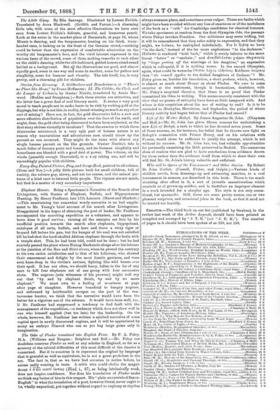The Odes of Pindar translated into English Prose. By F.
A. Paley, M.A. (Williams and Norgate ; Deighton and Bell.)—Mr. Paley can doubtless construe Pindar as well as any scholar in England, so far as a mastery of the critical difficulties of this most difficult of the classics is concerned. But if to construe is to represent the original by language that is graceful as well as equivalent, he is not a great proficient in the art. The fact is, that as we have had occasion to notice before, he seems sadly wanting in taste. A critic who could obelize the magni- ficent o t'n'e vvzs) iorxrd; (lliac4 i., 47), as being intrinsically weak, does not inspire confidence. Nor does his translation of Pindar make ns think any better of him in this respect. His "plain unvarnished Saxon- English " is what the translation of a poet, however literal, never ought to Is, wholly unpoetical, put together without regard to euphony or rhythm always common-place, and sometimes even vulgar. These are faults which might have been avoided without any loss of exactness or of the usefulness of the book as a "crib " for Cambridge candidates for classical honours. We take specimens at random from the first Olympian Ode, the passage where Pelops invokes Poseidon. Our criticisms may seem trifling, but it will be remembered that they refer solely to expression, and that they might, we believe, bo multiplied indefinitely. For is Oppcf we have "in the dark," instead of the far more euphonious "in the darkness." 11iOce6os is rendered "hold back," which is surely inferior to the more literal " fetter " or "enchain ;" and riltagraliraf rifles etryttrpti; by "keeps putting off the marriage of his daughter," an expression which is colloquial, if it is nothing worse. In the second Olympian, again, what could be worse for ectgrar Xe;yo; silepoYor; Kcikkolo xoUpter; than " the remark applies to the deified daughters of Cadmus "? Mr. Paley gives us, besides his translation, a short preface, which, however, is almost as much about Homer as about Pindar. We own to some surprise at the statement, though it harmonizes, doubtless, with Mr. Paley's sceptical theories, that there is no proof that Pindar committed his Odes to writing. This seems scarcely consistent with the view that no poems of antiquity have been so little tampered with. And where is this scepticism about the use of writing to end ? Is it to be extended to 2Eschylus, Herodotus, and Sophocles, the period of whose literary activity had begun before that of Pindar had ceased ?


































 Previous page
Previous page